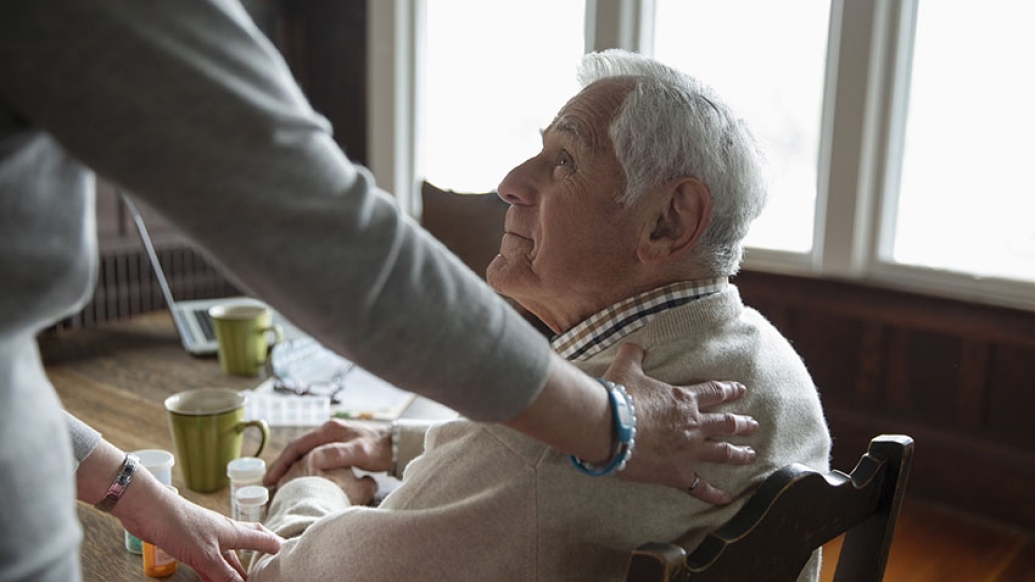It’s not just about making it through surgery, it’s about making it through recovery. Two Michigan Medicine experts share the importance of having an active support coach, or caregiver, after a procedure.
5:00 AM
Author |

With healthcare being an ever-changing landscape, bundled payments are becoming a more popular option for hospitals since it allows physicians to allocate a set amount of money to cover a patient's stay from their hospital admission all the way up to 90 days after their procedure.
This increasingly popular payment method has spurred G. Michael Deeb, M.D., a cardiac surgeon at Michigan Medicine, to find different ways of best preparing patients for life after discharge.
"We don't want our patients to undergo successful surgery and have a difficult recovery period when they leave us," says Deeb, "For us to be able to help the patient get the most out of potentially costly procedures, we need to make the transition from in-patient to out-patient as smooth as possible to improve clinical outcomes."
Smoother transitions to home care and recovery mean partnering with patients and their families. This partnership and shared accountability in the recovery process assures the patient gets the best mental and physical health care possible.
MORE FROM MICHIGAN: Sign up for our weekly newsletter
"We can only fix the surgical problem," says Kathryn Bennett MSN, a nurse practitioner in cardiac surgery at the Frankel Cardiovascular Center. "But by empowering and actively involving a patient's care team with ours, the patient will hopefully go home and have a successful recovery, getting back to feeling their best sooner."
That's where effective support coaches step in. A support coach, like a caregiver, is a friend or family member that follows a patient through their pre and post-operative journey. They help a patient recuperate after a procedure, reducing the chance of unnecessary admissions to rehab facilities or re-admission to the hospital.
Studies show that individuals in long-term care facilities have worse postoperative outcomes compared to those taken care of in a familiar environment.
"I don't want patients to come back and see me with an infection or serious depression," says Bennett. "I don't want patients to miss valuable time because there wasn't anyone at home active in their recovery."
We can only fix the surgical problem. By empowering and actively involving a patient's care team with ours, the patient will hopefully go home and have a successful recovery, getting back to feeling their best sooner.Kathryn Bennett, MSN, NP.
Active vs. passive support coach
When a patient comes in for the pre-operative consultation, one of Deeb's priorities is providing resources to help the patient identify their support coach.
Deeb and Bennett say it's important that support coaches aren't just individuals that visit a few times a week and give out medications.
To be an active support coach, an individual should:
-
Attend pre-operative visits.
-
Be present the day of surgery.
-
Visit the patient in the intensive care unit.
-
Learn the patient's routines for outpatient recovery.
-
Live with the patient, at minimum, for the first two weeks after their surgery.
Ideally, designated caregivers should be available for 30 days postoperatively until the patient has a follow-up appointment.
"Our team will provide a patient and their support coach with wound care instructions, guidance on medication usage and physical therapy exercises," says Deeb.
LISTEN UP: Add the new Michigan Medicine News Break to your Alexa-enabled device, or subscribe to our daily updates on iTunes, Google Play and Stitcher.
A support coach will also learn how to take an accurate temperature and blood pressure, monitor weight changes and detect physical or mental signs of distress in a patient.
"The highest level of care and responsibility will equal the lowest amount of risk and dollars spent on extraneous resources for recovery," says Deeb. "That's why the partnership between our team, the patient and their family or friends is so important."

Explore a variety of health care news & stories by visiting the Health Lab home page for more articles.

Department of Communication at Michigan Medicine
Want top health & research news weekly? Sign up for Health Lab’s newsletters today!





